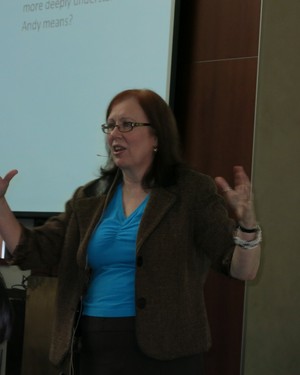The poet Carl Sandburg was quoted as saying: “Anything that brings you to tears by way of drama does something to the deepest roots of our personality. All movies, good or bad, are educational.”
Mixing clips from “Pursuit of Happyness” and the “Shawshank Redemption” with excerpts from such theologians as Jurgen Moltmann, Pamela Mitchell Legg, professor of Christian education at the Charlotte campus of Union Presbyterian Seminary (UPS), led a packed house in Early Chapel on the UPS campus here in an exploration of theology and film.
The Nov. 3 workshop was part of the centennial celebration of the Assembly Training School/Presbyterian School of Christian Education, the storied center for the development of generations of Presbyterian Christian educators.
“So what are we educating people in?” Mitchell Legg asked. “What do these stories have to do with theology?”
A lot, it turned out, according to workshop participants.
Mitchell Legg began with a clip from the Will Smith film “Pursuit of Happyness” in which a single father of a young boy has lost his job, is homeless and is temporarily living in the New York subway with his son. To ease his son’s anxiety, Smith engages the boy in a game of make-believe involving imaginary dinosaurs and the safety of a “cave” which in reality is a rest room.
Workshop participants spoke of the importance of generation-to-generation communication that what can be seen “is not all there is to the world.”
That idea was reinforced by a clip from “Shawshank Redemption” in which prison “lifer” Andy (played by Tim Robbins) risks further punishment by playing Mozart over the prison PA system. Explaining to Red (Morgan Freeman) why he did it, Andy replies that music “reminds me that there’s something inside that they can’t touch.”
The Rev. Ben Weir, former General Assembly moderator and Presbyterian missionary in Lebanon who was kidnapped and held hostage for 16 months, had the same experience, one participant noted. For Weir, it was not Mozart, but the recitation of Bible verses he had memorized throughout his life that kept his hope alive.
People who would never read theologians like Moltmann can still learn the lessons he taught about hope by watching movies like “Pursuit of Happyness” and “Shawshank Redemption,” Mitchell Legg said.
“God’s delight and God’s pain (the kingdom and the cross) are the foundations of Christian theology,” Moltmann wrote. “It’s out of the tension between these two that hope is born … for the kingdom in which God is wholly in the world and the world is wholly in God.”
Hope enables us to move beyond our resignation – Will Smith in “Pursuit of Happyness” and the prisoners in “Shawshank Redemption – “and begin to love life here and now,” Mitchell Legg said.
Movies, and all stories, Legg Mitchell said, “never just stand out there by themselves. They are communicated from one to another for a reason. Story – whether from a screenwriter or a biblical author -- gives name to the fear and gives a way to deal with it, gives tools for coping.
The son in “Pursuit of Happyness,” she said, “desire to see what his father sees and go with it.”
Movies, Mitchell Legg concluded, “can be one partner in our conversations of theological inquiry.”

